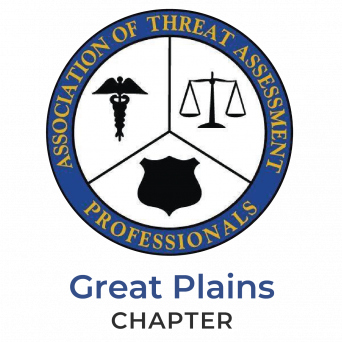This year's Great Plains Association of Threat Assessment Professionals Conference will focus on the importance of a multi-disciplinary approach in the prevention of targeted violence, particularly mass casualty events. Nationally known presenters will stimulate audience thinking about how threat assessment and management practices can be scaled operationally in a variety of environments. Sessions will include information appropriate for those new to the field of threat assessment and those with extensive experience.
Theme: Preventing Targeted Mass Casualty Attacks: Implications for Threat Assessment
Date/time: October 13, 2022, 8:30 a.m. to 4:30 p.m. (Central)
October 14, 2022, 8:30 a.m. to 5:00 p.m. (Central)
Registration: go.unl.edu/oct2022gpatap
Note: Registrants will be able to attend in-person or online via Zoom
Registration: Attendees registering for the conference have the option of:
- Face-to-Face Registration
- Virtual Registration
If you registered for the in-person conference but would like to switch to virtual, please contact Jason Shonerd at jason.shonerd@unl.edu or call 402-472-0194.
Who Should Attend: Threat assessment professionals in law enforcement, schools (elementary, secondary, and post-secondary), corporate security or human resources, and behavioral health professionals.
Planned Speakers:
- Mark Follman, author of Trigger Points: Inside the Mission to Stop Mass Shootings in America
Note: Copies of Mr. Follman's book will be available at a reduced price at the conference. Mr. Follman will be available to sign copies. - Andre Simons, Principal of Control Risks and Former FBI Behavioral Analysis Unit (BAU)*
- Gene Deisinger, PhD, Co-Author of The Handbook for Campus Threat Assessment and Management Teams*
- Bryan Flannery, Principal of Foresight Security Consultants, Corporate and Judicial Security expert*
- Mario Scalora, PhD, Univ. of Nebraska Public Policy Center*
- Denise Bulling, PhD, Univ. of Nebraska Public Policy Center*
*The conference has been approved for 7.5 total continuing education credits for psychologists across indicated sessions. Full details of these sessions are included at the bottom of this page.
Objectives:
- Explore threat assessment as a means to prevent targeted mass casualty attacks
- Discuss evolving best practices in targeted violence prevention
- Describe practical applications of threat assessment in operational environments
Event Hosts:
This event is hosted by the Association of Threat Assessment Professionals Great Plains Chapter, Nebraska Department of Health and Human Services—Division of Behavioral Health, and the University of Nebraska Public Policy Center.
The University of Nebraska Public Policy Center (NUPPC) is approved by the American Psychological Association to sponsor continuing education for psychologists. The NUPPC sponsors this event and maintains responsibility for this program and its content.
Registration Cost:
- Members, Law Enforcement, and Full-time Students (in-person & virtual) $250.00
- Non Members (in-person & virtual) $295.00
If you have questions, please contact:
Jason Shonerd | jason.shonerd@unl.edu | 402-472-0194
Andre Simons - Active Shootings: Rejecting the New Normal
 Speaker: Andre Simons, MA
Speaker: Andre Simons, MA
Date/Time: October 13, 9:00 p.m. to 10:15 p.m. CST
Continuing Education: 1.25 credits for psychologists
Instructional Level: Intermediate
Title: Active Shootings: Rejecting the New Normal
Description: Active shootings continue to represent a challenge for all sectors of society, with the FBI recording a 52% increase in the number of targeted violence attacks in the U.S. between 2020 and 2021. This session will explore the operational implications of the data and how threat assessment professionals must adapt to respond to evolving offender tactics and motives in this persistent risk. The presentation will blend case examples with research to demonstrate the critical need for refreshed engagement and creative approaches within and beyond the ATAP community.
Objectives:
1. Describe how active shooters are evolving and changing in their targeting and motives.
2. Explain how trends and patterns in active shooting attacks must prompt adjustments in threat assessment and management.
3. Describe the value of agile threat management operating collaboratively across a spectrum of venues using specific case examples involving completed and thwarted attacks.
Bryan Flannery - Better Care for People: The Bi-product of Multi-disciplinary, Community Based Threat Assessment
 Speaker: Bryan Flannery
Speaker: Bryan Flannery
Date/Time: October 13, 3:15 p.m. to 4:30 p.m. CST
Continuing Education: 2.5 credits for psychologists
Instructional Level: Intermediate
Title: Better Care for People: The Bi-product of Multi-disciplinary, Community Based Threat Assessment
Description: The majority of threat assessment cases will never rise to the level of the "exceptional case", and our day to day practitioners can find themselves moving quickly though case triage, and management strategies that can feel mundane. This presentation will examine several case examples where a person of concern was not necessarily on the "pathway to violence" but because their situation was managed by a community based that assessment team, was treated with greater care and concern than usual.
Objectives:
1. Describe the importance of community based multi-disciplinary threat assessment teams.
2. List the local and regional community resources available to threat managers.
3. Refresh the "view" of threat assessment practitioners.
Gene Deisinger - Advancing BTAM in Educational Settings: Perspectives of a Practitioner
 Speaker: Gene Deisinger, PhD
Speaker: Gene Deisinger, PhD
Date/Time: October 14, 9:00 a.m. - 10:15 a.m. CST
Continuing Education: 1.25 credits for psychologists
Instructional Level: Intermediate
Title: Advancing BTAM in Educational Settings: Perspectives of a Practitioner
Description: From Iowa City to Columbine, Virginia Tech, and beyond, threat management has evolved as a standard of practice in educational settings, often as a result of painful gaps and systemic challenges. This session will briefly summarize and discuss the state of the profession, including lessons learned and confirmed over a professional lifetime of practice. The facilitator will discuss considerations, challenges and opportunities for the continued development of the field.
Objectives:
1. Identify key developments in the field of BTAM.
2. Identify and apply lessons learned to enhance practice.
3. Identify and consider challenges and opportunities for enhancing the field.
Mario Scalora - Reporting Systems - Encouraging Bystanders…. to be Upstanders
 Speaker: Mario Scalora, PhD
Speaker: Mario Scalora, PhD
Date/Time: October 14, 1:00 p.m. to 2:15 p.m. CST
Continuing Education: 1.25 credits for psychologists
Instructional Level: Intermediate
Title: Reporting Systems - Encouraging Bystanders…. to be Upstanders
Description: Acts of targeted violence directed toward a variety of settings have been consistently preceded by a range of warning signs or "leaked" behaviors. In many circumstances, such concerning behaviors were not reported to responsible parties who can potentially address the concerning behavior. Dr. Scalora will summarize recent literature regarding factors that facilitate and inhibit the reporting of concerning behavior. Messaging and structural
approaches will be detailed to address hesitancy to report by various stakeholders.
Objectives:
1. Describe in detail a range of potentially trusted gatekeepers who should be targeted to promote the reporting of concerning behavior.
2. List at least three attitudinal factors that inhibit the reporting of concerning behavior.
3. Articulate at least three practical strategies to facilitate the reporting of warning behaviors.
Denise Bulling - 988: Implications for Threat Assessment
 Speaker: Denise Bulling, PhD
Speaker: Denise Bulling, PhD
Date/Time: October 14, 2:45 p.m. to 4:00 p.m. CST
Continuing Education: 1.25 credits for psychologists
Instructional Level: Introductory
Title: 988: Implications for Threat Assessment
Description: All states, Tribes, and territories are engaged in the roll-out of 988. This three-digit number replaces the National Suicide Prevention Lifeline. Additionally, behavioral health crisis systems across the country are expanding to include someone to respond (mobile crisis teams) and somewhere to go (crisis stabilization facilities). This talk will provide an overview of 988 system planning efforts and the implications for threat assessment teams.
Objectives:
1. Provide an overview of planning efforts for the new national mental health/substance use crisis system.
2. Describe the interface between threat reporting and the 988 system.
3. Discuss potential challenges and opportunities for Threat Assessment Teams as 988 systems are being implemented.

